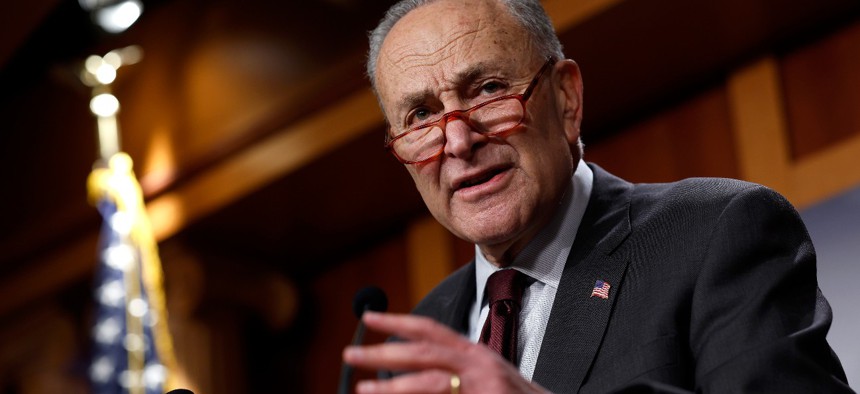House Approves Omnibus Spending Bill, Funding Agencies Through September

Senate Majority Leader Chuck Schumer, D-N.Y., said the bill's passage involved, "a lot of hard work, a lot of compromise." Anna Moneymaker/Getty Images
After significant delay and compromise, Congress has finally set spending levels across government for fiscal 2023.
The House on Friday passed by 225-201 the fiscal 2023 omnibus spending package, finally averting a shutdown through September and setting line-by-line spending levels at every agency in government.
The bill now heads to President Biden’s desk, with the Senate already passing it Thursday afternoon after significant year-end drama over the timing and details of the vote. Because that process can be time consuming for such a large piece of legislation, Congress has also passed another one week stopgap bill—the third of the fiscal year—that will keep agencies afloat through Dec. 30.
The House approved the measure over the objection of nearly all House Republicans, who had hoped to punt on full-year appropriations until January when they will hold a majority. The current slim Democratic majority held strong, providing enough votes to get the funding package over the finish line.
The underlying spending package provides an overall increase to non-defense discretionary spending of about 6% for a total of $773 billion, while Defense spending is set to soar by 10% to $858 billion. While Democrats failed to achieve their goal of equal funding increases on the two sides, the bill will achieve key priorities for both parties. It will also provide supplemental funding of about $45 billion for Ukraine aid and $41 billion for disaster relief.
An agreement on the omnibus bill had evaded appropriators for months as they sought a compromise on the top-line funding level and the defense and non-defense spending levels. Democrats had threatened to write their own omnibus or pass a year-long continuing resolution, but ultimately lawmakers reached an agreement last week and subsequently scrambled to fill in the details. Negotiators released the text of the omnibus early Tuesday morning and rushed to find an agreement on which amendments would receive votes in the Senate and the timing of final passage. While some lawmakers bemoaned the condensed schedule, the looming snowstorm and the appeal of getting home for the holidays created an opening for all 100 senators to go along with the expedited timeline.
"A lot of hard work, a lot of compromise," Senate Majority Leader Chuck Schumer, D-N.Y., said of the omnibus after it passed his chamber on Thursday. "But we funded the government with an aggressive investment in American families, American workers, American national defense. "It is one of the most significant appropriations packages we've done in a really long time."
House Speaker Nancy Pelosi, D-Calif., had hoped to pass the bill Thursday night to allow lawmakers to make their flights out of Washington Friday morning, but ultimately the process of moving the package from one chamber to the other took too long. Biden this week thanked lawmakers for their “broad bipartisan support” for the omnibus and its funding for Ukraine and said he looked forward to signing it into law soon.
Read our coverage of what is actually in the more than 4,000 page omnibus here.
NEXT STORY: 2022 Year in Review: Critical Update






